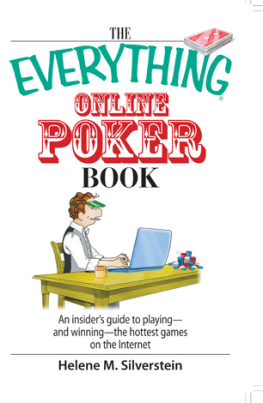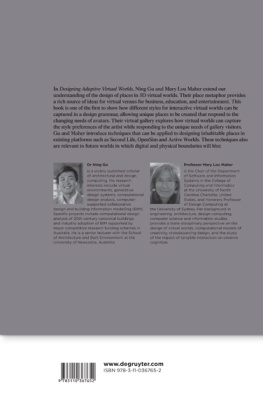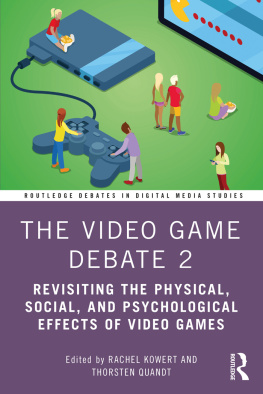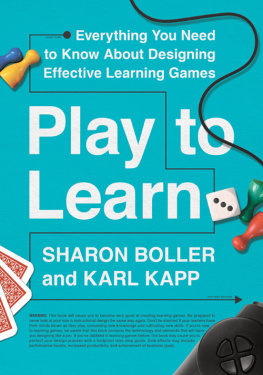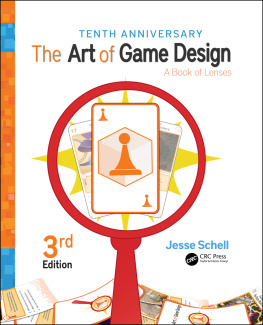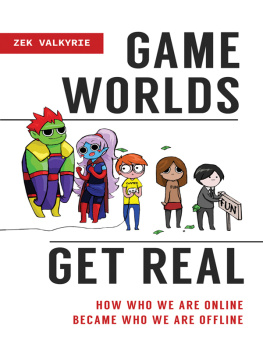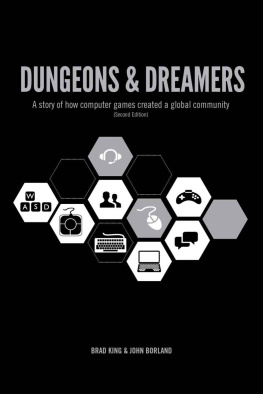THE PROTEUS PARADOX
NICK YEE
THE PROTEUS PARADOX
HOW ONLINE GAMES AND VIRTUAL WORLDS CHANGE USAND HOW THEY DONT
Yale UNIVERSITY PRESS
NEW HAVEN & LONDON
Copyright 2014 by Nick Yee.
All rights reserved.
This book may not be reproduced, in whole or in part, including illustrations, in any form (beyond that copying permitted by Sections 107 and 108 of the US Copyright Law and except by reviewers for the public press), without written permission from the publishers.
Yale University Press books may be purchased in quantity for educational, business, or promotional use. For information, please e-mail sales.press@yale.edu (US office) or sales@yaleup.co.uk (UK office).
Set in Monotype Joanna type by Keystone Typesetting, Inc.,
Orwigsburg, Pennsylvania.
Printed in the United States of America.
Library of Congress Cataloging-in-Publication Data
Yee, Nick, 1979
The proteus paradox : how online games and virtual worlds change us
and how they dont / Nick Yee.
p. cm.
Includes bibliographical references and index.
ISBN 978-0-300-19099-1 (hardback)
1. Computer games. 2. Virtual reality. 3. Shared virtual environments. I. Title.
GV1469.15.Y44 2014
794.8dc23 2013024662
A catalogue record for this book is available from the British Library.
This paper meets the requirements of ANSI/NISO Z39.481992
(Permanence of Paper).
10 9 8 7 6 5 4 3 2 1
To Doug, for showing me that this was possible
CONTENTS
ACKNOWLEDGMENTS
Throughout my research career, Ive been incredibly fortunate to have had supportive and prescient mentors who helped me think about and study online games and virtual worlds in new ways. At Haverford College in 1998, Doug Daviss course on personality psychology also involved learning how to hand code HTML and run web surveys. When I proposed an independent study project exploring EverQuest gamers, Doug unknowingly launched my research career by helping me identify the psychological questions waiting to be answered. His ideas of how psychology and technology intersect have always been and remain an inspiration. During my graduate program at Stanford University, Jeremy Bailensons contagious intensity and drive led to the four most productive years of my academic career as we used virtual reality to understand what it means to have a digital avatar. I couldnt have asked for a more supportive and astute graduate adviser who could discuss theory, methods, and technical tools with the same savviness. It was also during my graduate program when Nic Ducheneaut brought me onboard as an intern at the Palo Alto Research Center as he pioneered new ways of collecting and analyzing large-scale data in online games. As a mentor and colleague over the past eight years, weve shared some amazing adventures together in game data. This book would not be possible without them.
Over the past decade, more than fifty-five thousand online gamers have participated in my surveys. I cannot thank them enough for their time, their willingness to share their stories, and their insightful comments.
At LaunchBooks, my agent, David Fugate, helped me understand the publishing world and figure out what kind of book I wanted to write. And last but not least, Joe Calamia at Yale University Press tirelessly read and reread drafts and revisions, always providing insightful suggestions on how to improve the flow, the structure, and the prose. Id like to thank him for all his help throughout the proposal and writing process, and for making this a better book.
THE PROTEUS PARADOX
INTRODUCTION MIRROR, MIRROR ON THE WALL
I needed to create a mirror. I was a graduate student at Stanford University, and several undergraduates with graphics and programming backgrounds were helping me build a virtual room for a research study. Our initial idea would have required complicated trigonometric calculations based on the viewers head position and what part of the room was visible behind him or her. The director of the Virtual Human Interaction Lab, Jeremy Bailenson, helped us cross this technical hurdle. Instead of using a reflective mirror, he suggested making a hole in the virtual rooms wall. Through this hole, the viewer would see an adjoining, flipped replica of the room. And a digital doppelgnger in that flipped room would mimic the viewers every movement. Virtual cloning triumphed over trigonometry, but we still had a problem: it was all too perfect. Instead of acting like a mirror, it looked like a stranger staring at you and mocking your movements from another room. With only a few days left before the study began, I had an idea. I added a translucent sheet of water stains in front of our mirror. With some grime, our mirror came together. Even in a virtual world, imperfection proved more believable.
In the lab experiment itself, we gave participants either an attractive or an unattractive avatar. They would see their new virtual selves in the virtual mirror and then interact with a virtual stranger. Within sixty seconds of being given a new digital body, participants in attractive avatars became friendlier and shared more personal information with the stranger than participants in unattractive avatars. Changing avatar height had a similar effect: people given taller avatars became more confident than people given shorter ones. Crucially, these behavioral changes followed users even when they had left the virtual world. Those recently given attractive avatars selected more attractive partners in a separate offline task. As we create and endlessly customize our avatars, they in turn influence how we think and how we behave. Virtual worlds change and control us in unexpected ways.
Bailenson and I coined a term for this power of avatars: the Proteus Effect. In the Odyssey, Homer describes the sea god Proteus as being able to change his physical form at will:
First he turned into a great bearded lion,
and then to a serpent, then to a leopard, then to a great boar,
and he turned into fluid water, to a tree with towering branches.
Proteus encapsulates one of the promises of virtual worlds: the ability to reinvent ourselves, to be one and many at the same time. But in my research, I have cataloged the inadvertent ways in which virtual worlds control how we think and behave. And more often than not, these behavioral changes have unlikely sourcesthings that we wouldnt have expected to have power over us, such as our avatars height or whether we can ask a preprogrammed city guard for directions when were lost.
Every day, millions of people log into massively multiplayer online role-playing games (often referred to as MMORPGs or just MMOs),
At first glance, these fantasy worlds could not be more detached from realityafter all, gnomes and dragons belong in storybooks. And indeed, when online games burst into the public consciousness in the early to mid-2000s, the media portrayed them as a seductive escape. In a 2006 article in the Washington Post, Lost in an Online Fantasy World, Olga Kazan noted that online gamers can be sorcerers or space pilots, their identities woven into a world so captivating, it is too incredible to ever leave. Unfortunately, some of them dont. A piece published the same year in the San Francisco Chronicle went further: The Internet once was seen as a golden information superhighway transporting the next generation to the Promised Land. Now it may feel more like a minefieldseductive on the surface, but seeded with subterranean hazards. Even when academics
Many researchers have emphasized the hopeful promises of freedom and empowerment in virtual worlds and online games. In her 1995 book on textual virtual worlds, ethnographer and psychologist Sherry Turkle wrote that these new worlds encourage us to think of ourselves as fluid, emergent, decentralized, multiplicitous, flexible, and ever in progress. Though Turkles current work is more pessimistic, recent books on gaming argue even more strongly for similar potentials. Game designer Jane McGonigals 2011 book
Next page

